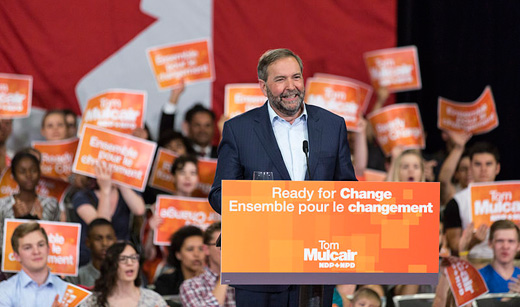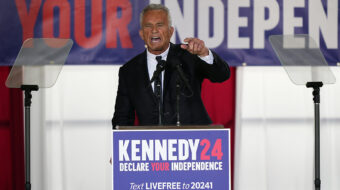
Meeting in Alberta’s capital city of Edmonton, in the heart of Canadian oil country, delegates to the federal convention of the New Democratic Party (NDP) voted Sunday to drop their leader Tom Mulcair, whom many blame for the social democrats’ major loss in last October’s election. Over the objections of Alberta NDP premier Rachel Notley, the convention also voted to open debate on the “Leap Manifesto,” a leftist platform that, among other things, calls for a transition away from fossil fuels and a moratorium on new oil pipeline construction.
Election failure brings down Mulcair
In an unprecedented move, 52 percent of delegates opted to remove Mulcair and begin the search for a new party leader. The crushing loss of confidence in Mulcair was largely a response to the party’s disastrous showing in the October 2015 federal election. Riding high in pre-election polling, the NDP was widely predicted to defeat Stephen Harper’s Conservatives and form Canada’s first social democratic government. Going into the contest, the NDP held Official Opposition status as the second-largest party, with 95 seats in Parliament. But by election night, the third-place Liberals had catapulted over both the NDP and the Conservatives to install Justin Trudeau as prime minister.
The NDP dropped to only 44 seats. Blame for the electoral disaster has been placed on Mulcair and party strategists’ decision to emphasize balanced budgets and pledges to leave income taxes for the wealthy untouched. These positions – out of character for a nominally left-wing party – overshadowed other parts of the NDP platform, such as $15-a-day childcare, opposition to the TPP, and a $15 minimum wage for federal workers.
Mulcair’s promises of fiscal discipline allowed the Trudeau Liberals to run to the left of the NDP and seize the mantle as the party of choice for a majority of anti-Harper voters. With the Canadian economy facing strong headwinds due to declines in world oil prices, Trudeau’s openness to deficit stimulus spending appeared more in tune with the times than did the NDP’s flirtations with austerity.
During the election, Mulcair appeared more comfortable playing the role of a cautious and moderate 1990s third way social democrat rather than a confident leftist. In a period when the popularity of unapologetic socialists like Bernie Sanders and Jeremy Corbyn is surging internationally, the image Mulcair presented seemed like something from another time.
One of the most prominent voices pushing Mulcair’s ouster was Hassan Yussuff, president of country’s largest union federation, the Canadian Labour Congress (CLC). Only days before the party convention, Yussuff told the press Mulcair did not deserve another term as leader, saying “we lost the opportunity to govern.” The head of the United Steelworkers, Ken Neumann, however, spoke out in support of Mulcair, saying he was “confident that the labour movement is going to be behind Tom.”
Though Mulcair lost the vote of confidence, he may stay on as party leader for as long as two years. Though there are names being suggested as successor – such as popular former MPs Peggy Nash and Megan Leslie, as well as current MPs Nathan Cullen and Niki Ashton – there is no clear favorite to take over the helm. The party’s executive must now begin the process of conducting a leadership contest.
Environment-centered platform to be debated
The divided stance of labor leaders regarding Mulcair’s future was not the only sign of a split party. Delegates also voted to open debate on a new left-wing platform called the Leap Manifesto, over the objections of Alberta party leader Rachel Notley. Her province’s economy is highly dependent on the export of tarsands crude, a major source of carbon emissions and environmental damage. Facing multi-billion dollar deficits, the Notley government’s future is tied to further investment in Alberta oil and a turnaround in world energy prices.
Along with its call to transition away from fossil fuels completely by 2050, the manifesto also prescribes new taxes on the financial sector, a guaranteed minimum income, an end to unequal free trade agreements, as well as a new focus on indigenous rights. Supporters of the document, such as author Naomi Klein, Charles Taylor, and others, believe that incremental change is no longer sufficient and argue that a qualitative “leap” in social and environmental policies is necessary.
Speaking out forcefully for a clear left perspective was former Ontario party leader and former UN ambassador, Stephen Lewis. In an address that challenged the progressive credentials of Trudeau’s Liberals, he criticized the centrist party’s continued shortcomings on national childcare, electoral reform, security and surveillance laws, and most recently, arms sales to the theocratic regime in Saudi Arabia.
Lewis said the NDP can again be the clear alternative to the Liberals and that members should launch a full debate on the Leap Manifesto. Quoting a former party leader, he told delegates:
“The modern democratic socialist should proclaim his or her aims loudly and passionately. The equality of men and women is the socialist watchword; the moral struggle against injustice and inequality is the socialist’s duty; to be a strong and powerful voice for common men and women against the abuse and oppression of the privileged minority is the socialist’s function; and to forge an ever finer and higher standard of values and a richer pattern of life and behavior is the socialist’s dream.”
The convention answered his call, voting by a clear majority to open a two-year debate on the manifesto at the local level. It will be considered again by the full party at the next policy convention in 2018.
With no clear successor to Mulcair emerging and the party platform in a state of flux, Canada’s social democrats are entering a period of uncertainty. Though the forces pushing for a leftward shift seem to have the momentum, there is no predetermined outcome to this process of transition.
The only comfort the party might take is that the Conservatives find themselves in a similar state. The Trudeau Liberals’ “Sunny Ways,” meanwhile, continue to enjoy the support of a majority of Canadians.
Photo: Wikimedia (CC)












Comments